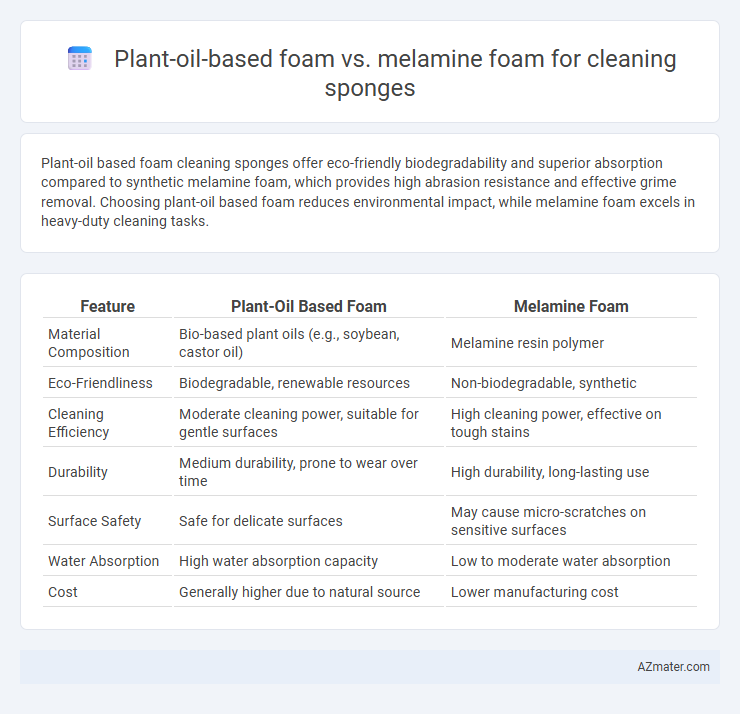Plant-oil based foam cleaning sponges offer eco-friendly biodegradability and superior absorption compared to synthetic melamine foam, which provides high abrasion resistance and effective grime removal. Choosing plant-oil based foam reduces environmental impact, while melamine foam excels in heavy-duty cleaning tasks.
Table of Comparison
| Feature | Plant-Oil Based Foam | Melamine Foam |
|---|---|---|
| Material Composition | Bio-based plant oils (e.g., soybean, castor oil) | Melamine resin polymer |
| Eco-Friendliness | Biodegradable, renewable resources | Non-biodegradable, synthetic |
| Cleaning Efficiency | Moderate cleaning power, suitable for gentle surfaces | High cleaning power, effective on tough stains |
| Durability | Medium durability, prone to wear over time | High durability, long-lasting use |
| Surface Safety | Safe for delicate surfaces | May cause micro-scratches on sensitive surfaces |
| Water Absorption | High water absorption capacity | Low to moderate water absorption |
| Cost | Generally higher due to natural source | Lower manufacturing cost |
Introduction to Plant-Oil Based Foam and Melamine Foam
Plant-oil based foam sponges are derived from natural oils such as soybean or palm oil, offering biodegradability and eco-friendly cleaning solutions. Melamine foam, composed of a rigid melamine resin, provides exceptional micro-abrasive properties that effectively remove dirt and stains without chemicals. Both materials serve as versatile cleaning sponges, with plant-oil foam emphasizing sustainability and melamine foam prioritizing high-performance stain removal.
Composition and Manufacturing Processes
Plant-oil based foam for cleaning sponges is derived from renewable resources such as soybean or castor oil, featuring biodegradable polymers that reduce environmental impact compared to synthetic materials. Melamine foam, composed primarily of melamine-formaldehyde resin, undergoes a thermosetting polymerization process resulting in a rigid, open-cell structure ideal for abrasive cleaning. Manufacturing plant-oil foam involves eco-friendly processes like bio-polymerization and solvent-free reactions, while melamine foam production relies on high-temperature curing and foaming agents to achieve its unique microstructure.
Environmental Impact and Sustainability
Plant-oil based foam cleaning sponges offer superior environmental benefits compared to melamine foam, as they are derived from renewable, biodegradable resources that significantly reduce plastic pollution and carbon footprint. Melamine foam, while effective in cleaning, is synthetic, non-biodegradable, and contributes to microplastic contamination in ecosystems. Choosing plant-oil based foam supports sustainable manufacturing practices and aligns with global efforts to minimize environmental impact through eco-friendly cleaning products.
Cleaning Effectiveness and Performance
Plant-oil based foam sponges offer superior biodegradability and a gentler cleaning action ideal for delicate surfaces, while melamine foam sponges excel in removing tough stains and grime due to their microstructure that acts like superfine sandpaper. Studies show melamine foam delivers higher cleaning effectiveness on hard surfaces such as countertops and tiles, thanks to its abrasive properties and ability to penetrate crevices. However, plant-oil based foams provide enhanced durability and are less likely to degrade with repeated wetting, making them a sustainable choice for everyday cleaning tasks with moderate dirt levels.
Abrasiveness and Surface Safety
Plant-oil based foam cleaning sponges exhibit lower abrasiveness compared to melamine foam, making them safer for delicate surfaces such as non-stick cookware and glass. Melamine foam, while effective in removing tough stains, possesses a micro-structured abrasive surface that can cause micro-scratches on sensitive materials. Selecting plant-oil based foam enhances surface safety by minimizing damage while maintaining efficient cleaning performance.
Durability and Lifespan
Plant-oil based foam sponges exhibit superior durability due to their natural elasticity and resistance to wear, often lasting up to 30% longer than melamine foam alternatives. Melamine foam, while highly effective for removing stubborn stains, tends to degrade faster under frequent use, especially with abrasive cleaning tasks. Choosing plant-oil based foam enhances sponge lifespan by maintaining structural integrity and reducing the need for frequent replacements.
Cost Comparison: Initial and Long-term
Plant-oil based foam sponges generally have a higher initial cost due to the sustainable sourcing and specialized processing required, whereas melamine foam sponges are typically cheaper upfront because of mass production and widespread availability. Over the long-term, plant-oil based foams may prove more cost-effective due to their biodegradability and reduced environmental disposal costs, while melamine foam often incurs higher replacement frequency and potential environmental impact fees. The total cost of ownership varies depending on usage patterns, durability, and environmental regulations influencing disposal and manufacturing expenses.
Health and Safety Considerations
Plant-oil based foam sponges offer a biodegradable and non-toxic alternative to melamine foam, reducing exposure to potentially harmful chemicals during cleaning. Melamine foam can release fine dust particles that may irritate skin, eyes, and respiratory pathways, posing health risks with prolonged use or inadequate ventilation. Choosing plant-oil based foam enhances safety by minimizing allergenic reactions and environmental impact without compromising cleaning efficiency.
Biodegradability and End-of-Life Disposal
Plant-oil based foams offer superior biodegradability compared to melamine foams, breaking down naturally in composting environments within months, reducing landfill burden. Melamine foam, composed of synthetic polymers, is non-biodegradable and persists for decades, complicating end-of-life disposal and increasing environmental impact. Choosing plant-oil based sponges supports sustainable waste management by enabling eco-friendly decomposition and minimizing plastic pollution.
Consumer Preferences and Market Trends
Plant-oil based foam cleaning sponges attract eco-conscious consumers seeking sustainable and biodegradable alternatives, driving increased demand in green household products. Melamine foam remains popular for its superior abrasive properties and versatility in removing tough stains, maintaining strong market presence in conventional cleaning supplies. Current trends show a growing shift toward plant-oil based foams due to rising environmental awareness, with manufacturers innovating formulations to enhance durability and cleaning efficiency.

Infographic: Plant-oil based foam vs Melamine foam for Cleaning sponge
 azmater.com
azmater.com